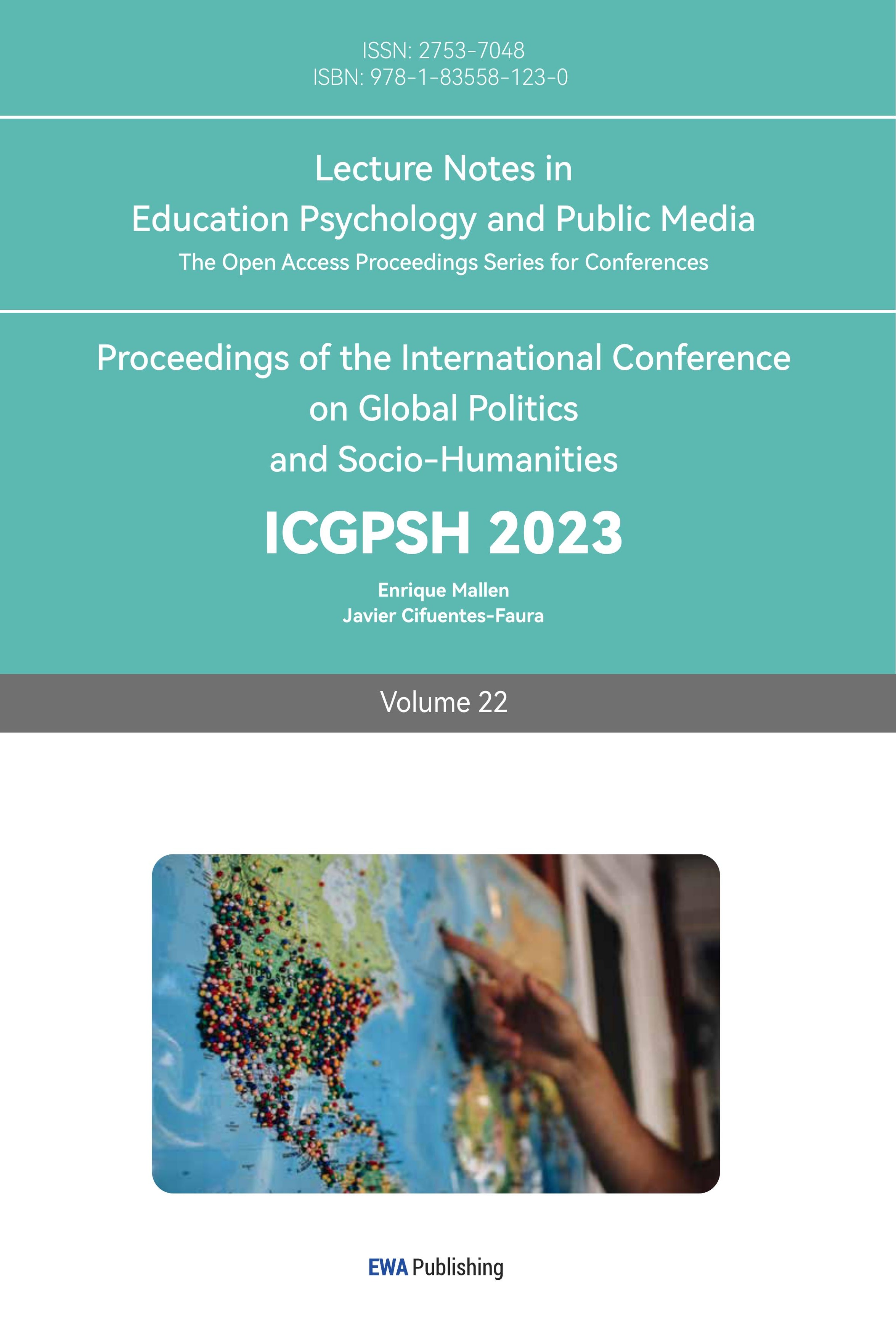References
[1]. OECD. (1999) Social Enterprises, Local Economic and Employment Development (LEED). OECD Publishing. Paris, 11.
[2]. KIM In-sun. (2016) A Comparative Study on the Development of Social Enterprises in China, Korea and Japan. Asia-pacific Economic Review, 199 (06), 99-103.
[3]. IMF. (2022) World Economic Outlook database. Retrieved from https://www.imf.org/en/Publications/WEO/weo-database/2023/April/download-entire-database
[4]. National Bureau of Statistics of China. (2023) National Data. Retrieved from https://data.stats.gov.cn/
[5]. Cheng, S., Zhao, X. (2023) Theoretical Innovation Logic and Implementation Path of the Third Distribution with Chinese Characteristics. Journal of Public Management(Quarterly), 20(03), 1-12.
[6]. CSESC. (2023) List of social enterprises. Retrieved from https://www.csedaily.com/scx/category/se
[7]. KIM In-sun. (2022) Social Enterprises in China, Japan and South Korea: Business Ecosystem and Practical Cases. Social Science Literature Press. Beijing, 23-24.
[8]. Kim, T.H., Moon, M. J. (2017). Using Social Enterprises for Social Policy in South Korea: Do Funding and Management Affect Social and Economic Performance? Public Administration and Development, 37(1), 15-27.
[9]. Doh, S. (2020). Social entrepreneurship and regional economic development: The case of social enterprise in South Korea. Sustainability, 12(21), 8843.
[10]. Korea’s official e-government website, Ministry of Administration and Security. (2021) https://www.index.go.kr/unity/potal/main/EachDtlPageDetail.do?idx_cd=2856, 2023.7.30.
[11]. Li, J. (2018) Social Enterprise Policy: International Experience and China’s Choice. Social Science Academic Press. Beijing, 259-270.
[12]. Korea Social Enterprise Promotion Agency. (2023) List of accredited social enterprises. Retrieved from https://www.socialenterprise.or.kr. 2023.7.28.
[13]. Berry, F.S., Choi, D. (2021). Can Infused Publicness Enhance Public Value Creation? Examining the Impact of Government Funding on the Performance of Social Enterprises in South Korea. The American Review of Public Administration, 51(3), 167-183.
[14]. KIM In-sun. (2015). The Development of South Korean Social Enterprise, Its Evaluation and Significance. Beijing Social Science, Num5, 122-128.
Cite this article
Dai,Y.;Jiang,H.;Tao,R. (2023). Analysis of Social Enterprise Policies in China and South Korea from a Comparative Research Perspective. Lecture Notes in Education Psychology and Public Media,22,286-294.
Data availability
The datasets used and/or analyzed during the current study will be available from the authors upon reasonable request.
Disclaimer/Publisher's Note
The statements, opinions and data contained in all publications are solely those of the individual author(s) and contributor(s) and not of EWA Publishing and/or the editor(s). EWA Publishing and/or the editor(s) disclaim responsibility for any injury to people or property resulting from any ideas, methods, instructions or products referred to in the content.
About volume
Volume title: Proceedings of the International Conference on Global Politics and Socio-Humanities
© 2024 by the author(s). Licensee EWA Publishing, Oxford, UK. This article is an open access article distributed under the terms and
conditions of the Creative Commons Attribution (CC BY) license. Authors who
publish this series agree to the following terms:
1. Authors retain copyright and grant the series right of first publication with the work simultaneously licensed under a Creative Commons
Attribution License that allows others to share the work with an acknowledgment of the work's authorship and initial publication in this
series.
2. Authors are able to enter into separate, additional contractual arrangements for the non-exclusive distribution of the series's published
version of the work (e.g., post it to an institutional repository or publish it in a book), with an acknowledgment of its initial
publication in this series.
3. Authors are permitted and encouraged to post their work online (e.g., in institutional repositories or on their website) prior to and
during the submission process, as it can lead to productive exchanges, as well as earlier and greater citation of published work (See
Open access policy for details).
References
[1]. OECD. (1999) Social Enterprises, Local Economic and Employment Development (LEED). OECD Publishing. Paris, 11.
[2]. KIM In-sun. (2016) A Comparative Study on the Development of Social Enterprises in China, Korea and Japan. Asia-pacific Economic Review, 199 (06), 99-103.
[3]. IMF. (2022) World Economic Outlook database. Retrieved from https://www.imf.org/en/Publications/WEO/weo-database/2023/April/download-entire-database
[4]. National Bureau of Statistics of China. (2023) National Data. Retrieved from https://data.stats.gov.cn/
[5]. Cheng, S., Zhao, X. (2023) Theoretical Innovation Logic and Implementation Path of the Third Distribution with Chinese Characteristics. Journal of Public Management(Quarterly), 20(03), 1-12.
[6]. CSESC. (2023) List of social enterprises. Retrieved from https://www.csedaily.com/scx/category/se
[7]. KIM In-sun. (2022) Social Enterprises in China, Japan and South Korea: Business Ecosystem and Practical Cases. Social Science Literature Press. Beijing, 23-24.
[8]. Kim, T.H., Moon, M. J. (2017). Using Social Enterprises for Social Policy in South Korea: Do Funding and Management Affect Social and Economic Performance? Public Administration and Development, 37(1), 15-27.
[9]. Doh, S. (2020). Social entrepreneurship and regional economic development: The case of social enterprise in South Korea. Sustainability, 12(21), 8843.
[10]. Korea’s official e-government website, Ministry of Administration and Security. (2021) https://www.index.go.kr/unity/potal/main/EachDtlPageDetail.do?idx_cd=2856, 2023.7.30.
[11]. Li, J. (2018) Social Enterprise Policy: International Experience and China’s Choice. Social Science Academic Press. Beijing, 259-270.
[12]. Korea Social Enterprise Promotion Agency. (2023) List of accredited social enterprises. Retrieved from https://www.socialenterprise.or.kr. 2023.7.28.
[13]. Berry, F.S., Choi, D. (2021). Can Infused Publicness Enhance Public Value Creation? Examining the Impact of Government Funding on the Performance of Social Enterprises in South Korea. The American Review of Public Administration, 51(3), 167-183.
[14]. KIM In-sun. (2015). The Development of South Korean Social Enterprise, Its Evaluation and Significance. Beijing Social Science, Num5, 122-128.









